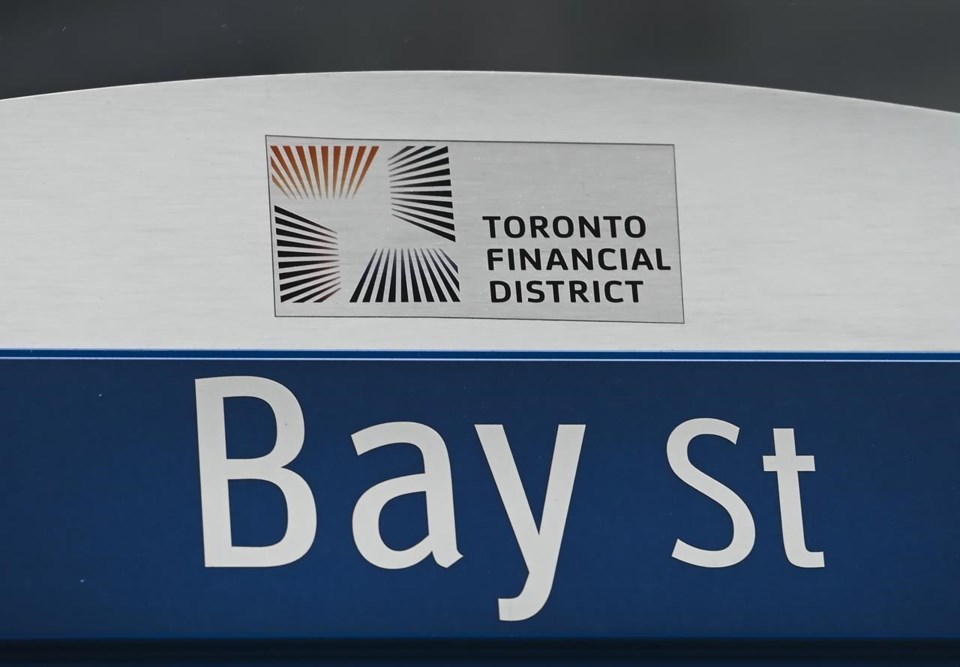sa���ʴ�ý's main stock index regained some of its recent losses as it rose more than 100 points in Thursday trading, while U.S. stock markets also moved higher.
The S&P/TSX composite index was up 154.76 points at 19,590.74.
In New York, the Dow Jones industrial average was up 116.07 points at 33,666.34. The S&P 500 index was up 25.19 points at 4,299.70, while the Nasdaq composite was up 108.43 points at 13,201.28.
The rebound in equities was in part due to easing pressure from global bond markets, which have been rattled by a growing realization that interest rates may stay high for a while. Last week, the U.S. Federal Reserve indicated it may not reduce rates by as much as investors previously anticipated.
“The way that central bankers are talking and the way the data is coming, it just doesn’t look like we’ll have cuts coming our way anytime soon,” said Konstantin Boehmer, co-lead of the fixed income team for Mackenzie Investments.
The threat of higher rates for longer has pushed Treasury yields up sharply in the bond market, with the yield on the U.S. 10-year climbing above 4.67 per cent on Thursday — close to its highest level since 2007 — before falling back down to 4.59 per cent later in the day.
European bond yields also rose dramatically higher Thursday in what Boehmer called “some nasty price action.
“There’s a reasonable chance that a few months from now we will look at this day and say that was the peak in rates. I hope for it, but I will not hold my breath,” he said.
“We’ve had over the past few weeks a lot of negative stories that became the dominant narrative in the market.”
Oil prices eased slightly Thursday, with the November crude contract down $1.97 cents at US$91.71 per barrel.
Soaring oil prices have been another factor adding to traders' interest rate fears this September.
While crude fell Thursday, it hit an all-time yearly high the previous day, and markets remain concerned about what high energy prices will mean for inflation and interest rates going forward.
"Even though oil prices should not dictate central bank policy, we’re all still in such a sensitive environment with regards to inflation that it matters," Boehmer said.
"Even if inflation is coming only from oil ... it still matters a lot, and it will still keep central bankers on call to make policy actions."
The November natural gas contract was up five cents at US$2.95 per mmBTU.
The December gold contract was down US$12.30 at US$1,878.60 an ounce and the December copper contract was up seven cents at US$3.71 a pound.
The Canadian dollar traded for 74.11 cents US compared with 73.99 cents US on Wednesday.
On the equities front, the best-performing sector on the TSX on Thursday was the consumer discretionary index, which rose 1.4 per cent.
Consumer staples, followed by the tech sector, had the next-best performance.
Boehmer said if global bond markets begin to ease in the days and weeks to come, that could have a really meaningful impact on other asset classes, including equities.
"If fixed income starts to stabilize, you could have a significantly different market environment going forward," he said.
But with so much focus on inflation right now, one wild card is the outcome of high-profile wage negotiations over the fall and into the winter, Boehmer said — in particular, the outcome of the ongoing strike by the United Auto Workers.
He said the potential for wage increases to drive inflation higher is a real economic risk.
"The UAW strike is so publicly visible that it carries so much more weight than all the others," he said.
"If it (influences) the way people feel (about wages), what they themselves want, how other unions are approaching similar topic – that’s a big worry for me.”
This report by The Canadian Press was first published Sept. 28, 2023.
Companies in this story: (TSX:GSPTSE, TSX:CADUSD)
Amanda Stephenson, The Canadian Press



